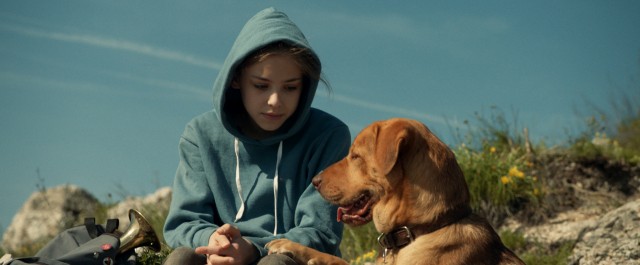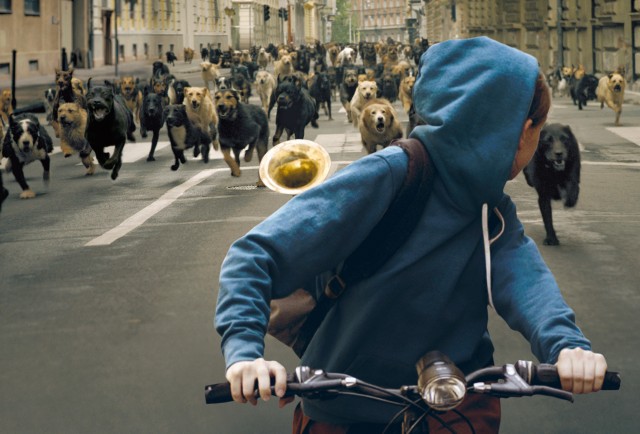WHITE GOD (FEHÉR ISTEN) (Kornel Mundruczó, 2014)
IFC Center, 323 Sixth Ave. at Third St., 212-924-7771
Lincoln Plaza Cinema, 1886 Broadway between 62nd & 63rd Sts., 212-757-2280
Opens Friday, March 27
www.magpictures.com
 You can add Hagen, the protagonist of Kornel Mundruczó’s White God, to the list of great canine characters in film, joining such esteemed company as Lassie, Benji, Beethoven, Sounder, Old Yeller, and, of course, Cujo. Played by year-old siblings Luke and Bodie, who were discovered by animal coordinator Teresa Miller in the classifieds, Hagen is man’s prototypical best friend — or in this case, the constant companion of thirteen-year-old classical trumpeter Lili (Zsófia Psotta) — smart and caring, loyal and loving, until things go really, really wrong. (Miller trained under her father, Karl Lewis Miller, who worked on such films as They Only Kill Their Masters, Dracula’s Dog, Call of the Wild, Babe, Cujo, and the Beethoven movies.) When her mother (Lili Horváth) and her new husband go away for a few months, Lili is forced to stay with her bitter, unhappy father (Zsótér Sándor), who refuses to register Hagen with the authorities and pay the dog tax. (In Hungary, mixed-breed dogs are taxed but purebred are not in an effort to control the feral population.) He throws Hagen out of their car, leaving him by the side of the road. At first Lili and Hagen try to find each other, but soon the dog becomes entangled in a series of dangerous situations, fighting for his life — and then fighting back, for mistreated mutts everywhere.
You can add Hagen, the protagonist of Kornel Mundruczó’s White God, to the list of great canine characters in film, joining such esteemed company as Lassie, Benji, Beethoven, Sounder, Old Yeller, and, of course, Cujo. Played by year-old siblings Luke and Bodie, who were discovered by animal coordinator Teresa Miller in the classifieds, Hagen is man’s prototypical best friend — or in this case, the constant companion of thirteen-year-old classical trumpeter Lili (Zsófia Psotta) — smart and caring, loyal and loving, until things go really, really wrong. (Miller trained under her father, Karl Lewis Miller, who worked on such films as They Only Kill Their Masters, Dracula’s Dog, Call of the Wild, Babe, Cujo, and the Beethoven movies.) When her mother (Lili Horváth) and her new husband go away for a few months, Lili is forced to stay with her bitter, unhappy father (Zsótér Sándor), who refuses to register Hagen with the authorities and pay the dog tax. (In Hungary, mixed-breed dogs are taxed but purebred are not in an effort to control the feral population.) He throws Hagen out of their car, leaving him by the side of the road. At first Lili and Hagen try to find each other, but soon the dog becomes entangled in a series of dangerous situations, fighting for his life — and then fighting back, for mistreated mutts everywhere.
Winner of the Un Certain Regard Prize at the 2014 Cannes Film Festival, White God is a powerful parable about the treatment of the homeless, of immigrants, of all those eking out existence on the fringes of society, the dogs representing slaves and other victims of colonialism, racism, and persecution. However, it is also overly manipulative and heavy-handed, the story line echoing the Planet of the Apes series but without enough nuance. (The film also evokes such classics as Spartacus and The Birds in theme and A Clockwork Orange in format.) Mundruczó (Pleasant Days, Johanna), who cowrote the film with regular collaborators Kata Wéber and Viktória Petrányi, shows tremendous skill with the dogs, particularly Hagen (who shares his name with a global pet product company) and his stray friend, an adorable Jack Russell Terrier (Marlene), making them deep, believable characters, but as the film grows more technically adept, it also gets colder, more distant, the human characters less realistic. The last half hour or so goes back and forth between being fierce and terrifying to overbearing and preachy. It certainly makes its point, though — and it’s likely to leave you thinking twice before you yell at your dog again.

